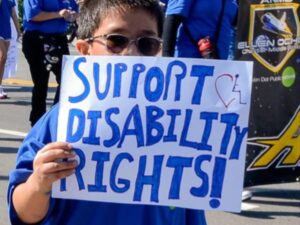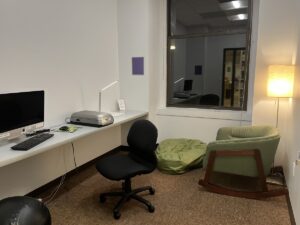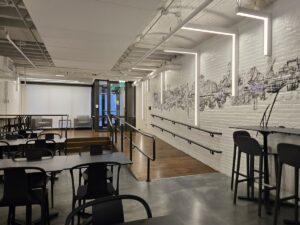The Disability Pride flag was originally designed by writer and disability activist Ann Magill. The colors each represent an important component of disability rights: gray for grief and anger, red for physical disabilities, gold for neurodiversity, white for invisible or undiagnosed disabilities, blue for emotional and psychiatric disabilities, and green for sensory disabilities.
DISABILITY PRIDE MONTH
Throughout July, we celebrate Disability Pride month, an annual observance in the United States honoring and amplifying the diverse stories and experiences of people with disabilities.
Disability Pride Month also commemorates the Americans with Disabilities Act (ADA), which was signed into law on July 26, 1990. The ADA aims to protect the rights of people with disabilities by preventing discrimination and promoting inclusion.
Sharing our experiences and normalizing conversations about ability status, access needs, ableism, and disability in our community is the first action we can take for a more inclusive culture, one that supports accessibility for everyone.
Emerson respects, honors, and appreciates our disabled and neurodiverse community members. Accessibility is infused throughout our Extraordinary Emerson 2030 Strategic Plan, addressing aspects of our campus experience, communications, facilities, and entire Emerson culture.
Please explore the events and resources below to learn more about Disability Pride Month.
DISABILITY PRIDE THROUGHOUT THE YEAR
July is Disability Pride Month but December 3 is the annual International Day of People with Disabilities. Here are a few words from Emerson staff members Erin Robins and Matt Fisher on the importance of honoring and raising awareness of people living with disabilities.
Los Angeles Disability Pride Parade

Every October, Los Angeles County hosts its annual Disability Pride Parade, fostering a stronger and more inclusive community by raising awareness and celebrating all aspects ofdisability.
Everyone with disabilities and their allies who are dedicated to creating an inclusive community that values the dignity, humanity, and worth of all individuals is welcome.
DISABILITY PRIDE RESOURCES
Emerson College Iwasaki Library Disability Pride Resource Guide
Sensory-Friendly Study Room
 Emerson’s Iwasaki Library (Walker, 3rd Floor) features a Sensory-Friendly Study Room—located to the right of the service desk—that is available on a drop-in basis.
Emerson’s Iwasaki Library (Walker, 3rd Floor) features a Sensory-Friendly Study Room—located to the right of the service desk—that is available on a drop-in basis.
The Sensory-Friendly Study Room includes dimmable lights, a white noise machine, and a light therapy lamp, in order to make the space accessible to people with particular sensory needs.
Sensory-Friendly Dining Room
Emerson’s Dining Services offer s a Sensory Dining Room on the Boston campus, located inside 25 Boylston Place, across from the lower-level entrance to the Dining Hall. Hours of operation are 7–9 a.m., 11 a.m.–1 p.m., and 5–7 p.m.
s a Sensory Dining Room on the Boston campus, located inside 25 Boylston Place, across from the lower-level entrance to the Dining Hall. Hours of operation are 7–9 a.m., 11 a.m.–1 p.m., and 5–7 p.m.
The Sensory Dining Room is an extension of the Dining Hall, designed to accommodate individuals who prefer a sensory-reduced environment.
EVENTS
Museum of Science – Boston
 Moving Close to the Ground: A Messy Love Song
Moving Close to the Ground: A Messy Love Song
July 30, 7 p.m. Free with Pre-Registration
Celebrate Disability Pride Month at the Museum of Science with disability writer and activist Eli Clare as he combines storytelling and critical thinking to explore the lived experiences and meanings of crawling and scooting in the natural world. What do we lose when non-disabled people value strong steady walking over other modes of mobility?
